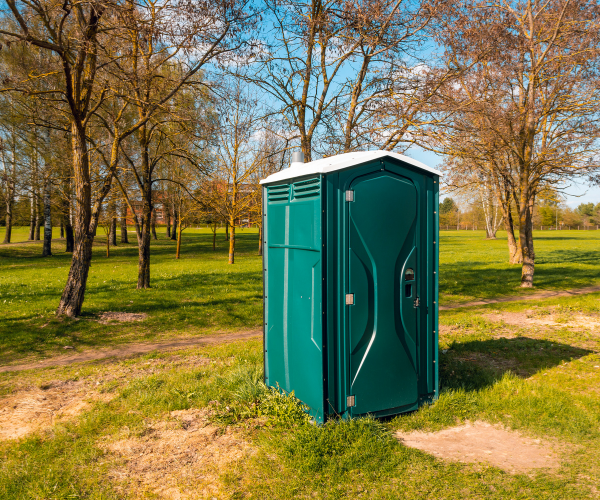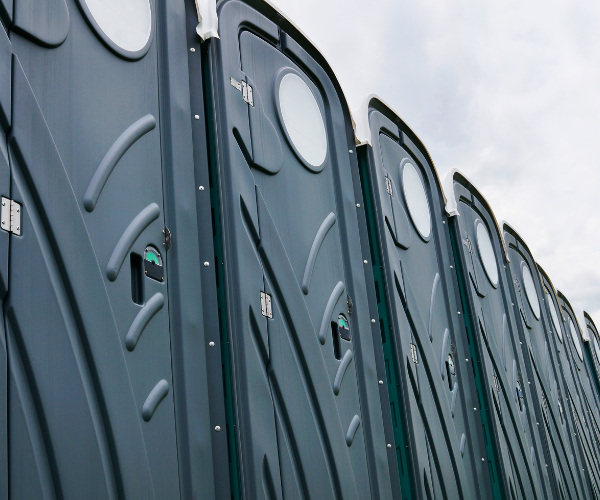Portable toilets offer significant eco-friendly advantages, which make them an ideal choice for sustainable event management and construction sites. First, they greatly reduce water usage, as traditional toilets consume large volumes of water per flush. With portable toilets, this water is saved and preserved, which plays a crucial role in conservation efforts especially in regions facing water scarcity. Furthermore, the design of portable toilets consolidates and treats waste separately, reducing pollution risks to local water supplies. This waste can often be collected and processed in a controlled environment where treatment practices meet environmental safety standards. In addition, the compounds used in portable toilets are typically biodegradable, breaking down naturally and reducing long-term environmental impact. Moreover, the process of managing and transporting waste is organized within a closed system that limits exposure to surrounding areas, thus minimizing pollution risks. Portable toilets also support a cleaner environment by offering a controlled, research-backed method of waste collection that improves hygiene and reduces the spread of illnesses. Equally important is their role in maintaining cleanliness at outdoor sites, containing potentially detrimental impacts on nature reserves and parks during large gatherings. Overall, portable toilets represent a forward-thinking solution to waste management challenges, aligning with global goals of sustainable development and environmental preservation.

Portable Toilet Rentals in Palm Beach County, Florida
Call today for a free quote (772) 280-9299
Portable Toilet
Fast, Easy, & 100% Free To Get Started
Decades of Expertise
For more than 20 years, our Portable Toilet services have reliably served Palm Beach County. Emphasizing community engagement, we consistently deliver experiences that showcase our commitment to quality and customer satisfaction.
Unmatched Quality Assurance
Our commitment to quality means each portable toilet in our fleet is thoroughly inspected and maintained. We ensure that our clients receive clean and dependable units every time.
Swift and Timely Delivery
We prioritize prompt delivery, ensuring that your portable toilets arrive on time and in perfect condition. Our expedited service is designed to respond quickly to any client demand.
Reliable Portable Toilet Rentals in Palm Beach County
Call for a Free Quote Today
(772) 280-9299
For those in need of the best portable restroom solutions in Palm Beach County, our locally owned company stands by its commitment to quality and reliability. Servicing areas across the county and beyond, we provide portable toilets for an array of events including construction sites, parties, festivals, and weddings. Our durability and cleanliness standards ensure each unit meets the highest expectations, providing a dependable infrastructure for any event. With a solid reputation born from years of service, we pride ourselves on being your trusted partner for all portable restroom needs. Choose us for exceptional service, community-focused solutions, and a dedication to customer satisfaction.


Standard Portable Toilet
Our standard porta john rental units are durable and reliable for any commercial build site, housing development, public works project, or remodel job.
Features include dome lighting, grated floors, and an “In-Use” locking mechanism for privacy and comfort.
Regularly maintained, inspected, and cleaned by FusionSite at your location.

Wheelchair Accessible Restrooms
Developed as an alternative to full ADA-compliant restrooms, the Liberty is a spacious, wheelchair-accessible unit that can also be promoted as a family-sized restroom.
Includes a patented flat-floor system for easy wheelchair access and maneuverability.
Handrails, paper holder, and rotary latch are designed for simple, intuitive end-user operation.

Portable Sink
Portable hand washing stations are essential for keeping your work site sanitary and clean.
Features hands-free foot pumps, liquid soap, and paper towels.
Perfect for job sites without water hookups, these units can handle hundreds of washes between services.
We Proudly Serve
Standard Portable Toilets
Offering Standard Portable Toilets across Florida, Freedom Waste ensures reliability and cleanliness for every rental.
High Rise Portable Toilets
Providing High Rise Portable Toilets designed for easy access and sanitation in Palm Beach County, Florida.
Restroom Trailers
Freedom Waste's Restroom Trailers in Palm Beach County offer luxurious amenities for upscale outdoor events.
Roll off Dumpsters
Reliable Roll off Dumpsters at Freedom Waste ensure efficient waste management solutions in Palm Beach County.
Septic Tank Cleaning
Freedom Waste offers expert Septic Tank Cleaning services throughout Florida to maintain system efficiency.
Grease Trap Cleaning
Comprehensive Grease Trap Cleaning services in Palm Beach County, Florida, keeping your operations smooth and compliant.
Fencing & Barricades
Efficient Fencing & Barricades solutions by Freedom Waste make Florida events secure and organized.
Residential Storage
Safe and accessible Residential Storage solutions in Palm Beach County, tailored to Florida's diverse needs.
Palm Beach County Portable Facilities
The process of obtaining a quote for portable toilet services in Palm Beach County has never been easier. Our user-friendly website allows clients to navigate effortlessly through forms, conveniently positioned at the top and bottom of each page. For those seeking efficiency, our 'Get A Quote' buttons provide instant access to pricing information. To request a quote, simply provide your first name, last name, phone number, and email. Once submitted, our team ensures a swift response, offering competitive pricing details tailored to your specific needs. Following this step, we coordinate with each client to schedule prompt delivery, ensuring that portable toilet arrangements align seamlessly with their event schedule. The ease of accessing our services reflects our commitment to a streamlined rental process. By prioritizing customer convenience, we reinforce our stance as a leading provider of portable toilet solutions in the region. As we respond promptly and with precision, clients can rest assured that their sanitation requirements will be met with proficiency and care.

Experience the allure of Palm Beach County, where Florida's natural beauty serves as the backdrop for thriving outdoor events. Our portable toilet services elevate any occasion by delivering clean, reliable, and convenient amenities. Whether your event is a festival, wedding, or community gathering, our units ensure guests enjoy optimal comfort and sanitation. From the lively atmosphere at SunFest music and art festival to the tranquility of the Morikami Museum and Japanese Gardens, our dedicated team supports local events with top-quality services that blend seamlessly with the area's vibrant activities. Palm Beach County presents endless opportunities for outdoor enjoyment, and our portable toilets stand as the ideal companion for any event. Opting for our services means more than just clean units. We deeply understand the local culture and uphold high standards, reflecting the region's sophisticated yet relaxed character. Discover how our unmatched portable toilet solutions guarantee smooth and enjoyable events.
Choosing the best portable toilet service is essential for a successful event in Palm Beach County. Our local expertise and years of experience deliver unmatched service. What distinguishes us is our profound understanding of the community's needs, which we transform into customized solutions and personal touches.
Why We Excel shows in our commitment to quality. Our units are diligently maintained and supported by outstanding customer service. From festivals to private events, our reputation stands for reliability. Experience the difference with our premier service, crafted specifically for the unique Palm Beach County atmosphere.
Fast & Reliable Services characterize our company at its core. We focus intently on every detail of portable toilet delivery, ensuring we meet your needs swiftly and with precision. Our team, dedicated to punctuality, mirrors the fast-paced demands of today's event organizers.
Depend on us for more than mere time efficiency. Our reliability stems from a solid history of satisfied clients and successful events throughout Palm Beach County. Each service we provide guarantees not just speed but also immaculate cleanliness and operational excellence, offering peace of mind for any occasion.
Explore Our Palm Beach County Portable Toilets
Renting a portable toilet in Palm Beach County is a straightforward process designed with customer convenience in mind. Begin by navigating to our website where you'll find clear Get A Quote buttons distributed across the pages for immediate access. Upon clicking, you'll be prompted to fill out a form requiring basic contact information—first name, last name, phone number, and email. This information allows us to streamline your service and get back to you promptly with a personalized quote. Additionally, forms positioned at top and bottom of web pages facilitate easy navigation, ensuring you don't have to scroll excessively to begin your rental arrangement. Once your form is submitted, expect a swift response from our team, precisely detailing the rental options available and any competitive pricing applicable. We take the customer journey seriously, ensuring your interaction is handled with the highest professionalism to meet and exceed expectations. Beyond the digital process, our team is available for customer inquiries, enabling clear communication and timely resolution of any questions regarding your rental experience.
The delivery timeframe for portable toilet orders can vary depending on several factors, including the event's location and the specific requirements outlined by our clients. Typically, our service operates with efficiency and is dedicated to meeting tight deadlines, usually ensuring delivery within 24 to 48 hours of rental confirmation. This rapid service is a benchmark of our commitment to customer satisfaction. For events with particularly large orders or those requiring specialized setups, we recommend allowing for additional preparation time to ensure a seamless process. Our team coordinates closely with clients to establish a mutually convenient schedule, aiming to alleviate any potential logistical challenges. Additionally, we offer flexibility in scheduling, accommodating changes and delivering precisely when and where needed—be it during business hours or otherwise. To ensure peace of mind, our experts communicate throughout the process, offering updates on delivery statuses. Overall, the integration of technology and dedicated customer service professionals ensures our clients receive timely, efficient service, reinforcing the dependability and professionalism our company is known for.
Yes, we proudly service all types of events and construction sites, meeting a diverse range of needs with our comprehensive portfolio of portable sanitation solutions. From vibrant festivals and large-scale sporting events to elegant weddings and corporate gatherings, our units are adaptable and reliable. Whether you're hosting family reunions or any other special occasions, we ensure a seamless sanitation experience. Our inventory includes luxury restroom trailers for upscale events, standard porta potties, and specialized units such as ADA-compliant options for accessibility. We also offer premium roll off dumpsters, fencing, and barricades to assist in maintaining organized and safe environments, as well as portable sinks and hand sanitizing stations to promote hygiene. Our ability to cater to various event types highlights our operational flexibility and commitment to bespoke service, ensuring all guests are afforded both convenience and comfort. At every site, including challenging construction environments, our team remains proactive, professional, and prepared to handle unique logistical needs.

